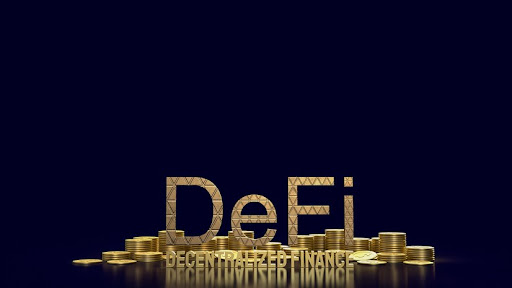Let's Discuss
Enquire NowDeFi, or decentralized finance, is a new idea in banking and finance that relies on peer-to-peer transactions made possible by blockchain technology. DeFi uses blockchain to enable “trust-less” banking, eschewing conventional financial intermediaries like banks or brokers.
What’s in it for investors?
By giving investors the chance to extend credit peer-to-peer and earn greater returns than those offered in conventional bank accounts, DeFi aims to help investors “become the bank.” Investors can send money quickly and easily to any location in the world, and they are able to access their funds without incurring traditional banking costs by using digital wallets.
Here is how DeFi works, how it might help people, how it differs from conventional banking, and what hazards it poses.

How DeFi works
With the help of decentralized technology, DeFi aims to offer many financial services that consumers and businesses already take advantage of, including loans, interest on deposits, and payments. DeFi effectively alters the industry by altering the way rather than the what. In other words, DeFi develops new infrastructure to offer comparable financial services and products.
It does this by utilising, among other things, smart contracts and blockchain technology. A specific type of ledger technology called blockchain keeps account of every transaction made on a certain financial platform. Consider it as a running record of all operations upon the specific blockchain, chronologically documented. If Person A gives the money to Person B, then the transaction will always be timestamped in the ledger.
“The building blocks of DeFi are smart contracts, which are executable codes that can store cryptocurrencies and interact with the blockchain according to its rules,” says Oleksandr Lutskevych, CEO and founder of CEX.IO, a firm that facilitates DeFi and cryptocurrency.
Smart contracts automatically carry out participant transactions to allow DeFi. They carry out their sequence of commands by themselves once the terms of the contract are met.
Key benefits of DeFi
DeFi may provide individuals with more security, perhaps reduced costs, a wider range of services, and the chance to make more money from their cryptocurrency investments. Through decentralized apps developed by diverse parties, these advantages and others are made possible.
“Decentralized applications, or dApps, allow people to transfer capital anywhere in the world (with fast settlement and at a low cost), peer-to-peer borrowing and lending, crypto exchange services, NFTs, and more services like crypto wallet and storage solutions,” Lutskevych says.
“DApps are preprogrammed by developers and depending on their purpose they can execute transactions on a specific blockchain network, settle agreements between buyer and seller, or move assets from a decentralized exchange to a decentralized lending platform,” he says.
The only restriction is your ability to create an app that follows your directions.
The capacity to make money is now a well-liked perk for bitcoin investors. Crypto staking, for instance, enables coin owners to maintain the ecosystem of their coin and get money by validating transactions. It is a component of yield farming. Given that bank interest rates have been at historically low levels for years, that has proven to be appealing.
Many dApps require liquid cryptocurrency to be available on the app in order to offer their services. To entice investors to store their coins for a while, they promise to provide an income or yield. In essence, they act as a form of revenue for all those who supply liquidity, riskier than revenue paid on deposits at conventional banks (as discussed below).
Owners of cryptocurrencies can harvest yield through a variety of services, based on the kind of dApp, including:
- Giving a coin exchange liquidity
- Peer-to-peer lending using a smart contract to a borrower
- Taking out loans against assets and mining the borrowed coins
- Investing in a proof-of-stake currency like Ethereum
Therefore, these methods of yield generation provide investors with an additional source of earnings, albeit you will still have to pay taxes on cryptocurrency profits just like you would on traditional kinds of income.
Risks of DeFi for investors
DeFi does have several disadvantages and hazards for potential users while sounding like a bright new future for finance:
Complexity: Going to a nearby bank is not as easy as taking part in DeFi.“DeFi can be a challenge for beginners to navigate because of the massive amount of DeFi applications and investment opportunities out there,” Malka says.“Even the onboarding process can be confusing for some people because you need to move money from an exchange like Coinbase into a non-custodial wallet, such as through MetaMask, to begin accessing the world of DeFi.”
Outright scams: Many con artists are trying to snag new cryptocurrency investors who have been attracted by yields that might far surpass those provided by traditional financial institutions. A high yield might be an unattainable dream.
Theft: Beyond simple fraud, it’s likely that cryptocurrency coins could be taken via vulnerabilities, particularly given the coding flaws in some dApps.“In these exploits, funds can be lost, and then it comes down to the core team behind the DeFi project to decide how, if at all, to compensate the participants,” says CEX.IO’s Lutskevych.
Cost: Smart contracts require a “gas cost” to be paid in order to interact with them, much like a machine needs a token to function. Multiple processes could easily add up in cost along the road, which could be particularly expensive for people with little financial resources. It is not uncommon that a ‘round trip’ can cost well over $200 in gas fees,” Lutskevych says.
Volatility: Although yield farming can lessen your risk in the risky world of cryptocurrencies, you’ll still need to put up with spectacular fluctuations in order to make what may be meagre rewards. Cryptocurrencies could end up losing a year’s yield or more in a single day very easily.
Fluctuating yields: Participants in DeFi also have to contend with shifting yields on top of volatile cryptocurrency prices. As even more supplies support a certain app, yields may decrease.
Dying projects: A particular dApp may eventually be abandoned when the core team working on it pursues new initiatives.“If one day, they decide to quit, the logic of the protocol will execute as is, but no further upgrades will take place,” Lutskevych says.
These are some of the greatest risks associated with DeFi, and investors who are considering investing need to be aware of them before committing fully.

How does DeFi challenge traditional banking?
One of the main assertions made by supporters of DeFi is that traditional banking will be disrupted by this new financial technology. They claim that in the worst-case scenario, DeFi would completely remove the intermediary from financial transactions, allowing decentralized systems of peers to take its place.
But why wouldn’t banks just adopt the technology and provide it if DeFi is so powerful?
“We are definitely seeing traditional financial institutions increasingly leverage blockchain and distributed ledger technology,” says Malka of YieldFarming.com. “You’ll see this really accelerate in the coming years as these traditional institutions all recognize the inherent security of being on the blockchain.”
Banks will likely develop a range of DeFi products, according to Malka, “to stay relevant and competitive.”
“You can easily imagine a scenario where a traditional bank creates yield-farming opportunities for their clients to participate in,” says he.
According to Lutskevych of CEX.IO, such a move would be more straightforward on paper than it would be in fact because of the regulatory load, complicating matters for conventional enterprises that even wish to make the change.
According to him, integrating blockchain technology will necessitate the alteration of numerous tried-and-true procedures while also exposing them to new dangers. Furthermore, subject to regulations, these institutions would require regulatory approval for these actions.
Beyond the fundamentals of cryptocurrency trading, those wishing to begin with DeFi should approach cautiously and make sure they partner with a trustworthy counterparty. Although DeFi’s yields are alluring, you shouldn’t let the possibility of a return make you ignore the other hazards. Any marginal benefits via yield farming could be swiftly lost due to a downturn in the cryptocurrency markets, and outright fraud or theft could further deplete your bitcoin holdings. If you have any projects regarding cryptocurrency in your mind, contact us.
Disclaimer: The opinions expressed in this article are those of the author(s) and do not necessarily reflect the positions of Dexlock.



